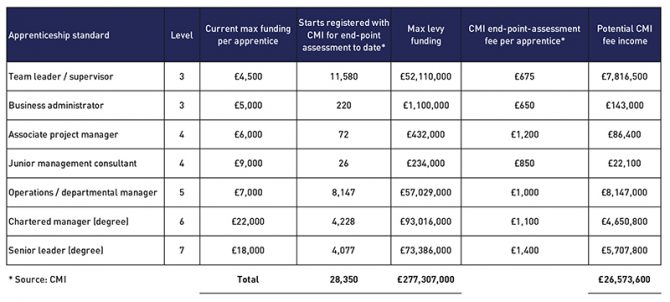It is boom time at the Chartered Management Institute (CMI), a charity with a turnover last year of £15 million, where thanks to the invention of the apprenticeship standard is set to see income more than double this year and its chief executive has received a £66,500 bonus.
CMI is approved to end-point assess seven apprenticeship standards from the level 3 team leader to the controversial level 7 MBA and already have 28,350 registered apprentices, at a levy cost estimated to be more than £250 million of which CMI would receive fee income of around £26 million.
Accounts for CMI published this year reveal the chief executive, Ann Francke, has already been rewarded with a £66,500 bonus, increasing her income to £336,000, a rise of 25 per cent on the previous year.
These vested interests are showing little concern for the best interests of apprentices
A spokesperson for CMI said the bonus was agreed by a “remuneration committee” and was “in recognition of the successful growth in learners, chartered managers and invoiced revenues in line with the organisation’s mission and purpose as set out in CMI’s Royal Charter”.
But the astonishing growth in management apprenticeships funded from the levy, as first predicted by FE Week in 2016, has not proven universally popular.
So CMI has been working hard to keep policy makers onside, spending £2.315 million last year, 15 per cent of all expenditure, on what their accounts call a “representational role and public relations”.
They spent even more in 2018, £3 million, and have launched over 12 reports, such as one called ‘The value of chartered managers’, as well as sponsoring roundtable events at Conservative Party conferences.
CMI also hold regular events in parliament to lobby MPs, such as earlier this month in which their twitter feed said it was “great to have our MP Barry Sheerman here to celebrate management apprenticeships today” and there was “much excitement about the value of management apprenticeships”.
A spokesperson for the charity claimed the expenditure on public relations was “not lobbying and it covers the direct and overhead costs for all thought leadership and research which is critical to delivering CMI’s mission”.
CMI produces data of their own and claims it shows the over 4,000 starts on the senior leader (MBA) apprenticeship is “driving up social mobility, levelling-up regional skills and boosting productivity”.
But the lobbying appears to have failed to impress the secretary of state for education, Gavin Williamson, who said last month he was “not convinced the levy should be used to pay for staff, who are often already highly qualified and highly paid, to receive an MBA”.
Williamson went on: “I’d rather see funding helping to kick-start careers or level up skills and opportunities. That’s why I’ve asked for a review of the senior leader apprenticeship standard to ensure it is meeting its aims.”
The spokesperson for CMI responded, saying: “De-funding higher level management courses or other drastic steps, taken in isolation without looking at the whole apprenticeships programme in the round, risks damaging our ambitions on addressing skills shortages, as well as reducing the quality of provision and training opportunities across the country.”

But Tom Richmond, former adviser to the former skills minister Matthew Hancock, produced his own report in January, which claimed the levy was descending into farce.
Richmond took particular aim at hundreds of millions being spent on “rebadging management training and professional development courses for more experienced employees”.
In response to figures in the latest set of CMI accounts, Richmond said: “It is disappointing to see that, for all its good intentions, the apprenticeship levy is now being openly exploited for commercial gain. Far from improving the productivity of UK plc, it appears that the startling growth in ‘management apprenticeships’ is just lining the pockets of senior executives at the CMI as well as some training providers.
Richmond added: “These vested interests are showing little concern for the best interests of apprentices or taxpayers, yet they are consuming hundreds of millions of pounds that could have been used to help young people start a career in a skilled job or occupation.
“Gavin Williamson was right to voice his concern about the rapid emergence of MBAs within the apprenticeship system. Even so, our recent EDSK report called on the government to go much further by scrapping fake apprenticeships such as rebadged management training courses, as this will ensure that the levy funding prioritises younger recruits instead of existing employees.”








Your thoughts